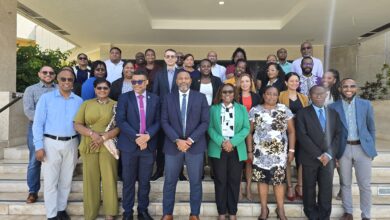(Caribbean Community Secretariat, Georgetown, Guyana) Heads of Government of the Caribbean Community (CARICOM) and Parliamentary Opposition Leaders have agreed to set up a six-member team to follow up on issues arising from their recent historic meeting in Saint Lucia and also to map the path for the way ahead.
The team will comprise three representatives on each side. The Opposition Leaders of Jamaica, Dominica and Guyana will make up the Opposition team while CARICOM Heads of Government are expected to decide on the composition of their team in due course.
At the end of their discussion, the Heads of Government and Parliamentary Opposition Leaders also agreed on measures to advance the CARICOM Single Market and Economy (CSME).
Prime Minister of Barbados, the Rt. Honourable Owen Arthur said that a major outcome of the Meeting was a commitment to win the confidence of people of the Region in respect of all aspects of the CSME. He said there is a view that the CSME is at danger of going on a two-track pace process and stressed that every effort is being made to ensure this does not happen.
Describing the Meeting as useful, leader of the Parliamentary Opposition of Jamaica, Mr. Bruce Golding said he was pleased with the decision taken to provide the opposition with all the material relevant to the establishment of the CSME. At the same time, he expressed concerns on the establishment of the Caribbean Court of Justice (CCJ). He noted that any institution, which will cause a degree of cessation of sovereignty, should get the endorsement of the people. Mr. Golding added that although Jamaica’s Parliamentary Opposition is not against the establishment of the CCJ, it has concerns about some of the provisions of the Court.
Meanwhile, Chairman of the Community and Prime Minister of Saint Lucia, Dr. the Honourable Kenny Anthony gave an undertaking to have a technical team meet with the Jamaica Opposition to dialogue on the concerns regarding the CCJ.
Prime Minister of St. Kitts and Nevis, Hon. Dr. Denzil Douglas expressed optimism about building consensus on the CCJ. He said the stage was set for “continued debate and all have agreed on the necessity to have the Court. The main stumbling block is how we ascertain that the sovereignty will be maintained in the way the Court is being conceived.”
Both sides said the meeting was a good first step in broadening the dialogue and widening the boundaries of governance.





